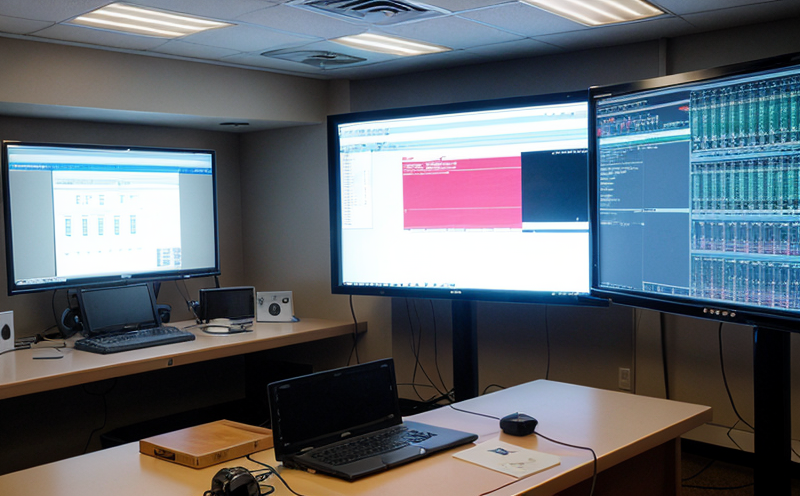IEC 61375 TCN (Train Communication Network) Interoperability Testing
The IEC 61375 standard is a cornerstone in railway and transportation systems, focusing on the interoperability of train communication networks. This ensures that various components from different manufacturers can communicate seamlessly across multiple train control systems. The TCN (Train Communication Network) Interoperability Testing service offered by our laboratory plays an essential role in validating the functionality and compatibility of these critical systems.
TCN is designed to handle real-time communication between trains, signaling systems, and other infrastructure elements. It supports various types of messages that are crucial for safe and efficient railway operations, including train control commands, status updates, and diagnostic information. The TCN network ensures that all connected devices can communicate effectively under a wide range of conditions.
The interoperability testing process involves simulating real-world scenarios to assess how different TCN components interact with each other. This includes testing the ability to exchange data accurately, securely, and reliably across various environments. The test setup replicates actual railway operations, allowing us to identify potential issues early in the development or commissioning phase.
Our laboratory uses state-of-the-art equipment and follows stringent international standards such as IEC 61375. This ensures that our tests are both comprehensive and accurate, providing reliable data for stakeholders involved in railway projects. By conducting these tests, we help ensure that all components meet the necessary performance criteria before they go into operation.
The testing process typically involves several stages, including initial configuration checks, functional testing under various conditions, and stress testing to simulate extreme operating scenarios. Each stage is designed to uncover any inconsistencies or failures that could affect overall system reliability. Our team of experts ensures that every aspect of the TCN network is thoroughly examined during these tests.
One key advantage of our IEC 61375 TCN Interoperability Testing service is its ability to provide detailed reports highlighting any areas where improvements are needed. These insights enable manufacturers and operators to make informed decisions about further development or modifications if necessary. Additionally, successful completion of these tests can contribute significantly towards achieving certification requirements set by regulatory bodies.
To better understand the scope of our testing capabilities, let’s explore some real-world applications where this service has proven invaluable:
- Testing different TCN components from multiple suppliers to ensure seamless integration within a single train control system.
- Simulating emergency situations such as power outages or signal malfunctions to evaluate resilience and recovery times.
- Evaluating the impact of environmental factors like humidity, temperature fluctuations, and vibration on TCN performance.
Industry Applications
| Application Area | Description |
|---|---|
| Railway Network Integration | Ensuring that all TCN components can communicate effectively with each other regardless of manufacturer. |
| Emergency Response Systems | Testing the reliability and speed of information exchange during critical situations like fires or accidents. |
| Environmental Compliance | Evaluating how TCN systems perform in various environmental conditions to ensure continuous operation. |
The IEC 61375 TCN Interoperability Testing is not only vital for railway operations but also extends its benefits to other transportation sectors, including urban public transport and freight logistics. By maintaining consistent standards across different modes of transportation, we contribute towards safer, more efficient travel experiences.
International Acceptance and Recognition
The IEC 61375 standard has gained widespread recognition among railway operators worldwide. Its acceptance by global bodies such as the International Union of Railways (UIC) ensures that our testing methodology aligns with international best practices. This alignment provides assurance to stakeholders involved in large-scale projects or international collaborations.
Regulatory authorities, including those responsible for safety certifications and standards compliance, often mandate adherence to IEC 61375 when evaluating TCN systems. Compliance with this standard enhances credibility and trustworthiness of the tested products among end-users and investors alike.
In addition to regulatory requirements, many railway companies have voluntarily adopted IEC 61375 as part of their internal quality assurance processes. This proactive approach helps them stay ahead in terms of technological advancements while ensuring robust network performance.
Use Cases and Application Examples
In practice, the IEC 61375 TCN Interoperability Testing has been used to support various railway projects. One notable example is the testing of TCN systems in high-speed rail projects where seamless communication between trains and ground infrastructure is crucial for passenger safety and comfort.
Another application involves integrating new signaling technologies into existing networks, ensuring compatibility without disrupting ongoing operations. Our tests have also been instrumental in validating TCN implementations during large-scale upgrades aimed at improving overall network efficiency.
The results from these tests provide critical feedback that helps manufacturers refine their products and operators enhance their systems further. This continuous improvement loop is essential for maintaining the high standards required by modern railway environments.





